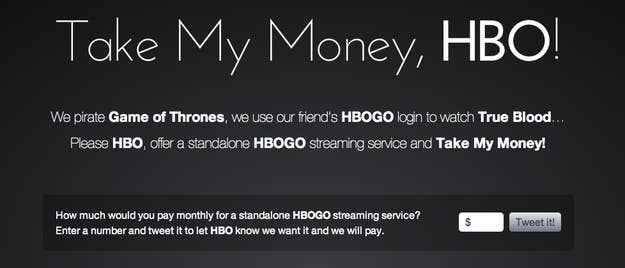
A lot of people want to watch HBO shows like Game of Thrones, True Blood and Girls (well, maybe not Girls) without subscribing to HBO, or cable at all. And a lot of them are watching the shows anyway, just without paying for them. So, some argue that HBO is leaving money on the table by not taking advantage of this massive potential audience. And thus, Take My Money HBO was born. It lets you put in the dollar amount you'd pay for a standalone HBO service, and tweet it.
What it shows, ultimately, is exactly why HBO probably won't offer a standalone service anytime soon: Hardly anybody knows how much it's worth.
Here's a lot of people who won't pay anything:
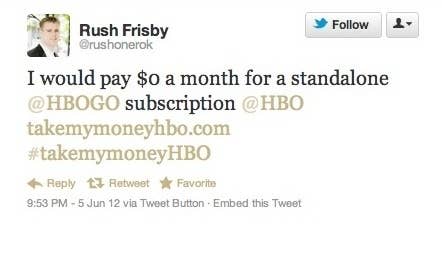
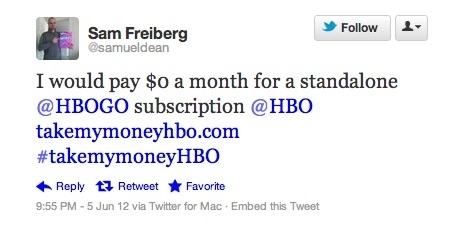
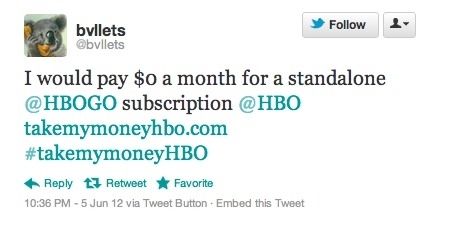
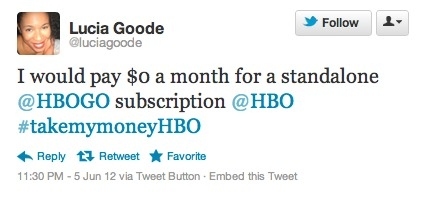
This really honest guy:
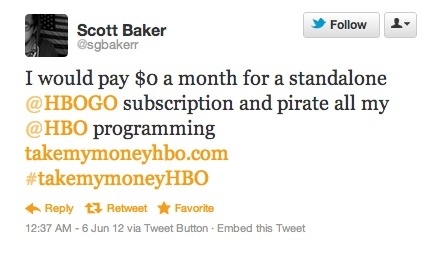
A few people who think HBO is at least worth the smallest amount of money they can think of:
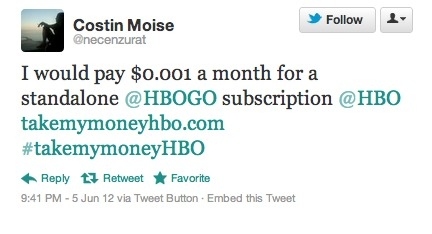
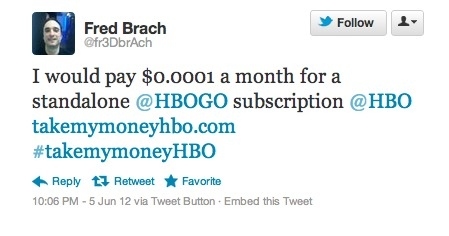
Finally, someone makes a serious offer:
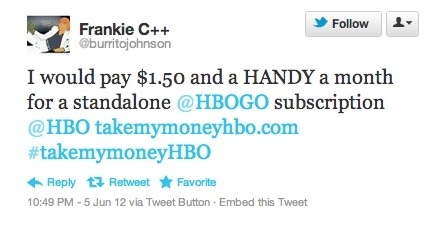
But at least HBO will have these clearly serious high rollers to keep them afloat:
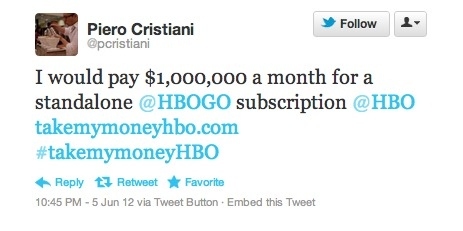
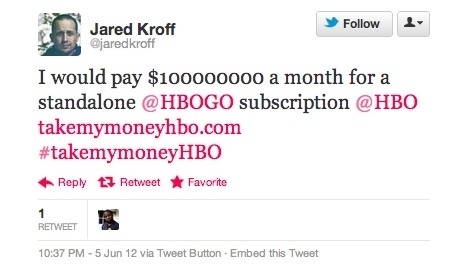
The earnest offers look a lot like this:
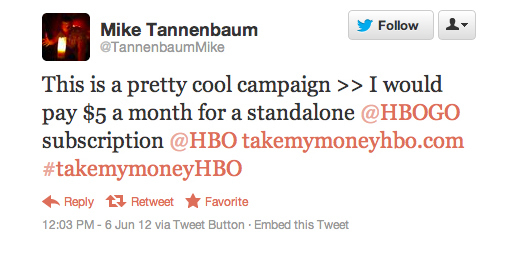
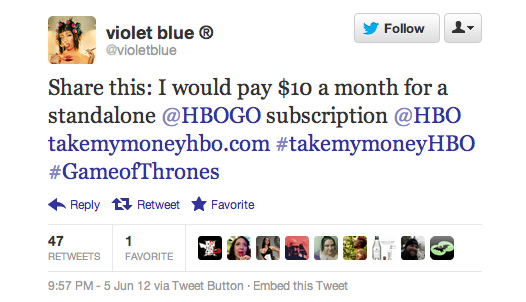
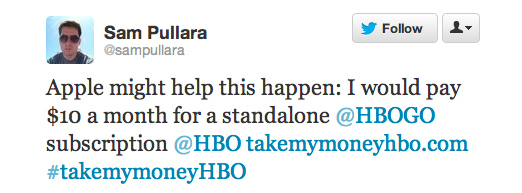
Guess what? That's still not enough. Leave it to the media writers to come closer to what it would actually take.
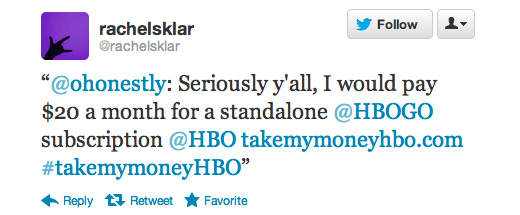
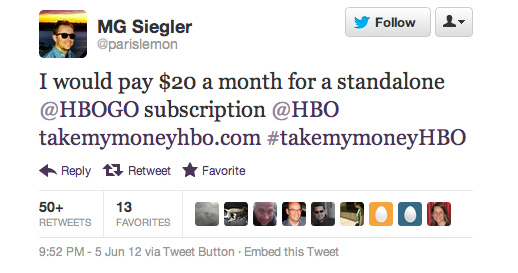
The problem, as Tim Carmody notes, is that even if you are willing to pay a real amount of money for HBO all by itself — say, $10-$20, which is what your cable company probably charges — it's not enough. Your cable company is charging you bulk pricing. It's $10 precisely because you're getting it with your cable subscription.
Or if you want the wordier answer straight from the horse's mouth for why you won't be able to pay for HBO without a cable subscription anytime soon, here's HBO president Eric Kessler addressing the issue, though Dustin Curtis has graciously transcribed what he says for the rest of us. Emphasis mine:
We benefit tremendously from the existing ecosystem. […] There are 60, 70, 80,000 customer service agents on the phone every day, and you know what they're talking about? They're talking about HBO. The affiliate covers that cost. The billing systems. That's the affiliates. If you watch HBO 5 minutes a month or 24 hours a day, 7 days a week, that's not a cost we have. In addition, we benefit tremendously from the fact that the cable operator bundles HBO into existing packages. So if they offer double-play or triple-play, you know, they say, get HBO free for three months. The ability to market and bundle with the affiliates is very beneficial to us. So it's very beneficial to us to keep that transactional machinery going.
What you don't want to do is to pursue a distribution channel over here [the internet], where you think, well, let's go around the affiliate and we'll get a couple hundred thousand subs. But the promotional, and packaging support we get over here [ed: the affiliate networks], which, by the way, is the foundation of our 30 million subs and enables us to get 10 million transactions, if that dissipates, and that shrinks, then we will lose a lot of subs over here. Because with 10 million transactions, you have to generate a lot of subs every single day. You can't afford to have that machinery slow down. So we'll gain a little over here [on the internet], and we'll lose a lot over here [with the cable affiliates], and we think there will not be a net gain, there would be a net loss. So it's really about economics and a business issue.
Let me talk about the streaming environment. … let me tell you how we view that. When a consumer is sitting on their couch, and they're sitting there and they're watching their 50" flatscreen TV ... the way they evaluate HBO and determine whether this is a good value, the reference set ... is the other networks that are coming on that flatscreen. They say to themselves, they think about the broadcast networks, the basic networks, and the other premium networks, and they say to themselves, is this entertainment experience, is it better? Is it different? Is it worth paying more money for? So they compare the HBO experience to the other networks.
If the consumer is now sitting on that same couch, and they got the iPad in their hand, and they're on HBO Go, the reference set changes. And it changes because the dominant distributors of television content and movies – certainly of television content – on that device is not the networks. The dominant distributors of that content are aggregators. It's Hulu, Hulu Plus, Netflix, Amazon, Apple, all of which have very different business models. It could be an ad-supported model. Hulu Plus is an ad supported model that you subscribe to. Netflix is a standalone subscription service. Amazon is a free service, part of the shipping deal that you used to use to get hard goods. Apple is of course an EST service, we're embedded.
[Hulu, Netflix, and Amazon] are aggregators. They're licensing content. What we do … we are content creators. And we believe in order to continue to differentiate the service … there's a tremendous opportunity to marry this platform, to marry HBO Go and this technology, with the content creation skills of our network.
TL;DR version of what he said: HBO is a premium network because cable company affiliates actively promote it as a premium network. People aren't accurately judging the value of a standalone HBO service because instead of comparing it to other TV networks which create content, they're comparing it to content aggregators like Hulu or content *cough* distributors like The Pirate Bay. Unless the reference set changes, so that people with an iPad find HBO as valuable as people on a 50" flatscreen do, they can't offer a standalone subscription without undermining their core business.
One day you will probably be able to buy HBO all by itself. But that day is after some serious tectonic shifts in the cable industry happens. Like maybe after the rest of your cable subscription is just another app. But good luck with that Twitter petition in the meantime.
Update A script calculates that the average price people are willing to pay according to these tweets is something like $12/month. Which HBO basically confirmed is nowhere near enough.
